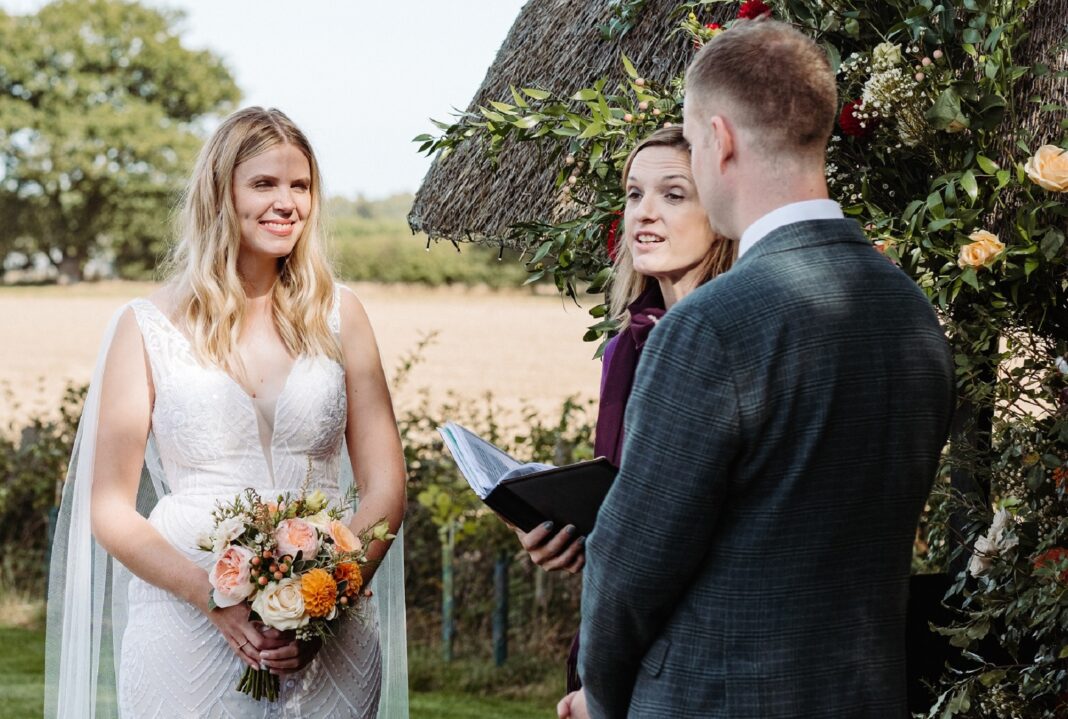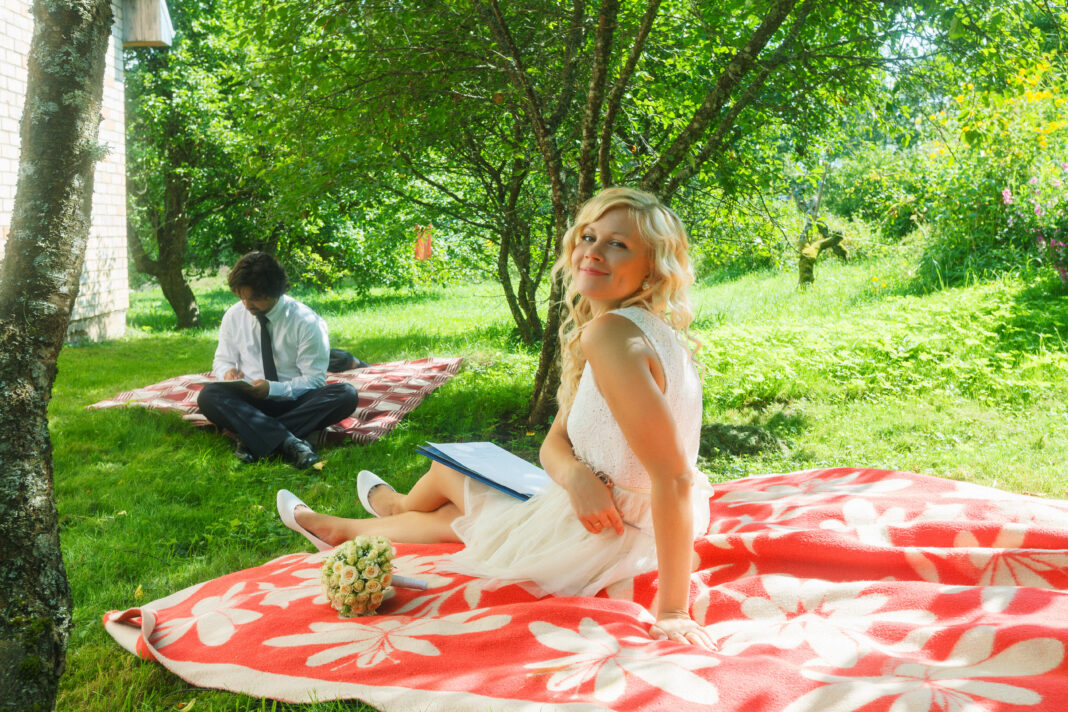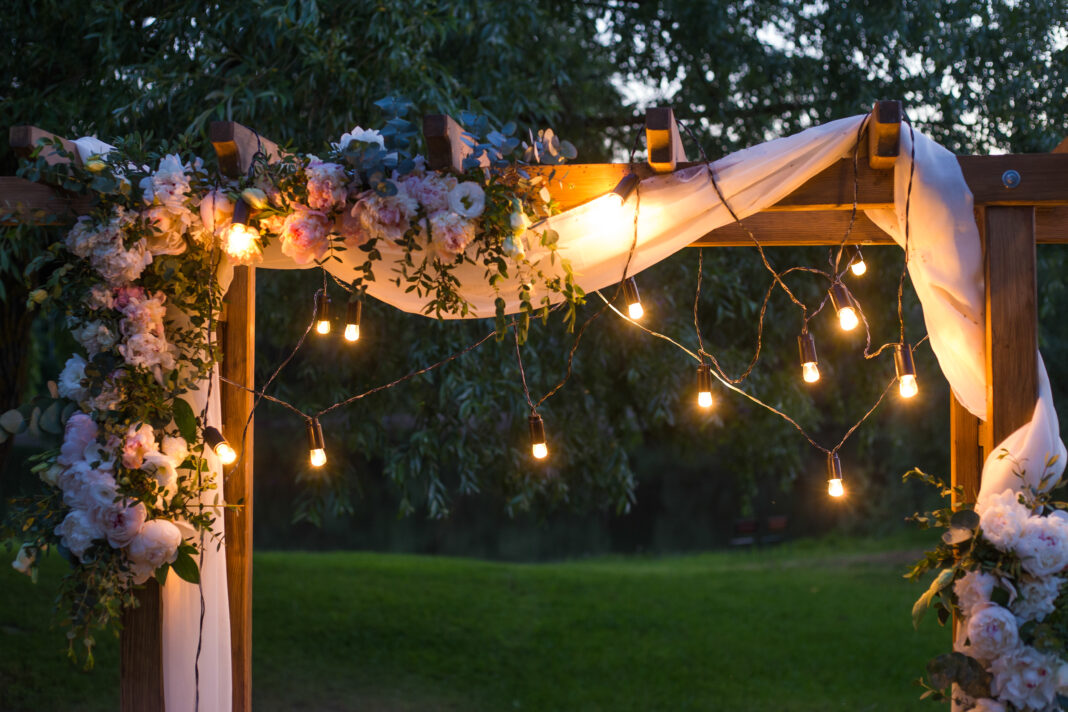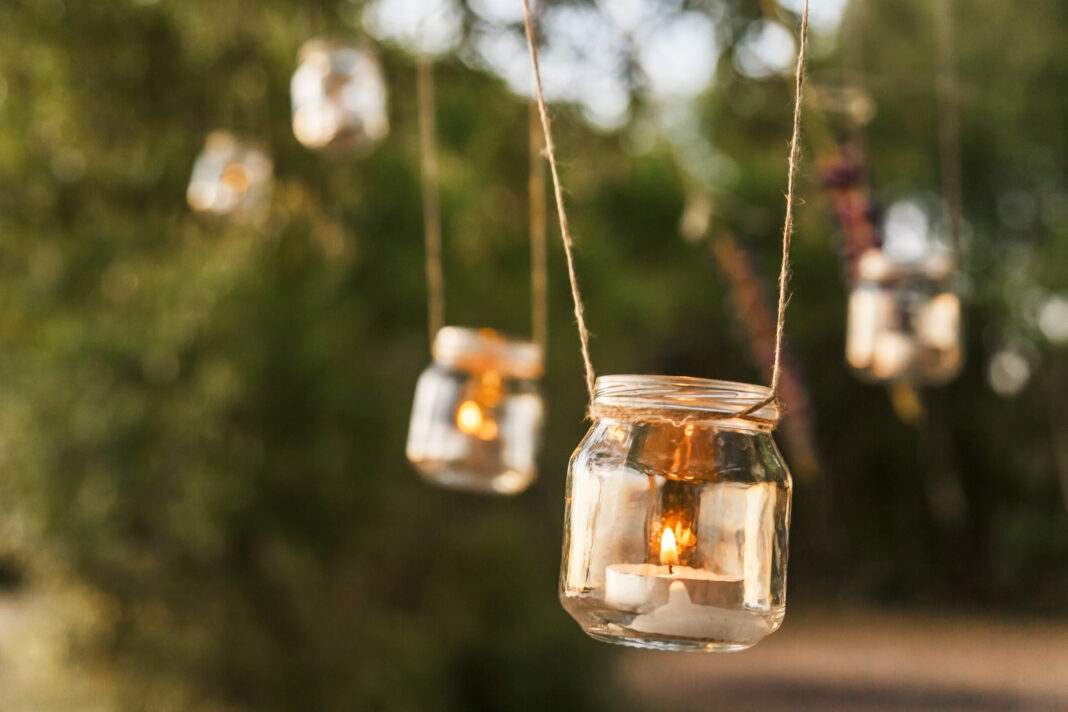
With local Covid-19 restrictions coming into force at different times in different places, many couples are trying to future-proof their wedding plans as much as they can by opting for a small, intimate, outdoor wedding which adheres to social distancing rules — and the easiest way to do this is to have a humanist wedding at home in the garden.
Humanist wedding celebrant Caroline Lambie and bride Amie Beverley share their top tips for having an amazing outdoor wedding ceremony at home and how to make it a wonderful event to remember.
Caroline says:
‘An intimate wedding ceremony can feel more meaningful and special than a big event. A lot of the ceremonies I’ve conducted in the past have been small, intimate ceremonies.
‘When you only invite the very closest people to you and it is a small space, the atmosphere can be electric. Also, your closest friends and family can really become a part of the ceremony rather than merely observers. It feels so good and everyone is so emotionally involved.’
1. Choose a humanist ceremony
‘What’s not to like?’ asks Amie. ‘Having an outdoor wedding and getting married in the garden with a humanist ceremony gave us the chance to really personalise every single detail – there were no rules to follow, no specific wording we needed to use, and we could decide the order in which things were done. The ceremony was so ‘us’ and we all thought it was so brilliant.’
In England and Wales, where humanist marriages are not yet legally recognised, there is no need to hold your ceremony at a licensed venue, which means you can have the wedding in your own back garden! Couples can register a marriage at the register office before or after your humanist wedding in order to make it legal but still have the kind of personalised humanist ceremony they really want.
In Northern Ireland and Jersey, humanist marriages conducted by Humanist Ceremonies celebrants are legally recognised, as are humanist ceremonies in Scotland. They can be held anywhere and do not have to take place in licensed premises.
2. Decorations
Making an outside space or marquee feel intimate and special for your wedding can be fun. Amie says, ‘Think about items you have at home and how you might repurpose them to decorate your outside space. You don’t need to buy specific wedding decorations: we used things that we already had such as fairy lights, Christmas decorations, vases, and mirrors.’
How about having your outdoor wedding ceremony under a tree? It looks great, offers protection from the elements, and you can hang bunting from it — or drape pretty fabric from branches or a wedding arch.
2. Seating
You don’t have to opt for expensive hired chairs for your guests; picnic blankets, cushions, pouffes, or hay bales can work just as well — although older or less mobile guests might appreciate a chair, so it’s always worth having a few on standby.
3. Have an all-weather plan
Make sure you’ve prepared an all-weather plan ready to be put into action. You could consider putting up a gazebo or hiring a marquee or tepee just in case.
Amie says, ‘Although we were lucky with the weather, we did make sure we made plans on what to do if it was wet, cold, windy, or if there was a heatwave on the day.’
4. Symbolic gestures
There are many symbolic gestures that can be incorporated into a humanist wedding ceremony and, as the betrothed won’t need to socially distance from one another, this type of ritual should still be allowed whenever the ceremony is held.
A popular symbolic act is ‘sharing a Quaich’ – a two-handled loving cup. Two different liquids can be blended to symbolise the blending of the two of you. As this is a Scottish tradition, unsurprisingly, whisky and water is traditional but it can be gin and tonic, a cocktail, or even a blended tea.
Another symbolic gesture you can incorporate into a ceremony is lighting a unity candle. You each have a candle that represents you as an individual and you light a third candle which represents your life together going into the future.
Ordinarily, family members can be involved in symbolic acts such as a handfasting, but when social distancing measures are in place, these won’t be possible. Your humanist wedding celebrant will be able to advise what the latest guidelines permit.
5. Into the evening
As the light begins to fade, you’ll need some illumination. Amie says, ‘A thrifty, yet pretty option is to use jam jars with night light candles inside (they don’t have to be real ones, the battery-operated candles look just as pretty and are longer-lasting).’
Thank you Caroline and Amie for sharing your top tips for an intimate outdoor wedding!
Featured celebrant
Caroline Lambie is a humanist celebrant who conducts weddings, vow renewals, funerals, and naming ceremonies in London and the surrounding areas. Caroline conducted Amie and James’ wedding in the family garden in Essex last year.
Featured photographer
Photos (where listed) by The Humble Photography Co.
Humanist weddings
A humanist wedding is ideal for you if you’d like a non-religious wedding that is unique, personalised, and meaningful.
Humanism
How do you know if you’re a humanist? Take our quiz and find out — or watch this short video where Stephen Fry explains humanism.
Wedding ideas and inspiration
For inspiration for your humanist wedding, follow us on Twitter, Facebook, Instagram, and Pinterest.
Next steps
If you’re thinking of having a humanist wedding, the next step is to find your ideal celebrant.








